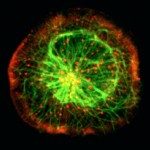Lien vers Pubmed [PMID] – 30282749
Lien DOI – 10.4049/jimmunol.1800372
J. Immunol. 2018 11; 201(9): 2624-2640
Endosomal traffic of TCR and signaling molecules regulates immunological synapse formation and T cell activation. We recently showed that Rab11 endosomes regulate the subcellular localization of the tyrosine kinase Lck and of the GTPase Rac1 and control their functions in TCR signaling and actin cytoskeleton remodeling. HIV-1 infection of T cells alters their endosomal traffic, activation capacity, and actin cytoskeleton organization. The viral protein Nef is pivotal for these modifications. We hypothesized that HIV-1 Nef could jointly alter Lck and Rac1 endosomal traffic and concomitantly modulate their functions. In this study, we show that HIV-1 infection of human T cells sequesters both Lck and Rac1 in a pericentrosomal compartment in an Nef-dependent manner. Strikingly, the Nef-induced Lck compartment contains signaling-competent forms (phosphorylated on key Tyr residues) of Lck and some of its downstream effectors, TCRζ, ZAP70, SLP76, and Vav1, avoiding the proximal LAT adaptor. Importantly, Nef-induced concentration of signaling molecules was concomitant with the upregulation of several early and late T cell activation genes. Moreover, preventing the concentration of the Nef-induced Lck compartment by depleting the Rab11 effector FIP3 counteracted Nef-induced gene expression upregulation. In addition, Nef extensively sequesters Rac1 and downregulates Rac1-dependent actin cytoskeleton remodeling, thus reducing T cell spreading. Therefore, by modifying their endosomal traffic, Nef hijacks signaling and actin cytoskeleton regulators to dually modulate their functional outputs. Our data shed new light into the molecular mechanisms that modify T cell physiology during HIV-1 infection.


